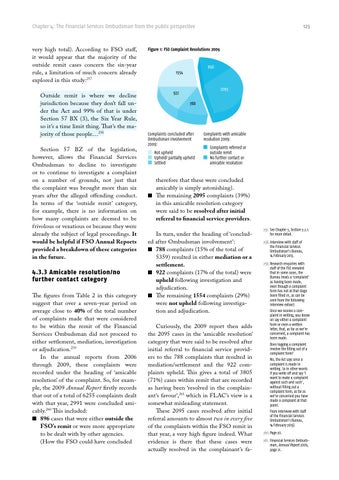123
Chapter 4: The Financial Services Ombudsman from the public perspective
very high total). According to FSO staff, it would appear that the majority of the outside remit cases concern the six-year rule, a limitation of much concern already explored in this study:257 Outside remit is where we decline jurisdiction because they don’t fall under the Act and 99% of that is under Section 57 BX (3), the Six Year Rule, so it’s a time limit thing. That’s the majority of those people…258 Section 57 BZ of the legislation, however, allows the Financial Services Ombudsman to decline to investigate or to continue to investigate a complaint on a number of grounds, not just that the complaint was brought more than six years after the alleged offending conduct. In terms of the ‘outside remit’ category, for example, there is no information on how many complaints are deemed to be frivolous or vexatious or because they were already the subject of legal proceedings. It would be helpful if FSO Annual Reports provided a breakdown of these categories in the future.
4.3.3 Amicable resolution/no further contact category The figures from Table 2 in this category suggest that over a seven-year period on average close to 40% of the total number of complaints made that were considered to be within the remit of the Financial Services Ombudsman did not proceed to either settlement, mediation, investigation or adjudication.259 In the annual reports from 2006 through 2009, these complaints were recorded under the heading of ‘amicable resolution’ of the complaint. So, for example, the 2009 Annual Report firstly records that out of a total of 6255 complaints dealt with that year, 2991 were concluded amicably.260 This included: 896 cases that were either outside the FSO’s remit or were more appropriate to be dealt with by other agencies. (How the FSO could have concluded
Figure 1: FSO Complaint Resolutions 2009
896 1554
2095
922 788
Complaints concluded after Ombudsman involvement 2009: Not upheld Upheld/ partially upheld Settled
Complaints with amicable resolution 2009: Complaints referred or outside remit No further contact or amicable resolution
therefore that these were concluded amicably is simply astonishing). The remaining 2095 complaints (39%) in this amicable resolution category were said to be resolved after initial referral to financial service providers. In turn, under the heading of ‘concluded after Ombudsman involvement’: 788 complaints (15% of the total of 5359) resulted in either mediation or a settlement. 922 complaints (17% of the total) were upheld following investigation and adjudication. The remaining 1554 complaints (29%) were not upheld following investigation and adjudication. Curiously, the 2009 report then adds the 2095 cases in the ‘amicable resolution’ category that were said to be resolved after initial referral to financial service providers to the 788 complaints that resulted in mediation/settlement and the 922 complaints upheld. This gives a total of 3805 (71%) cases within remit that are recorded as having been ‘resolved in the complainant’s favour’,261 which in FLAC’s view is a somewhat misleading statement. These 2095 cases resolved after initial referral amounts to almost two in every five of the complaints within the FSO remit in that year, a very high figure indeed. What evidence is there that these cases were actually resolved in the complainant’s fa-
257. See Chapter 3, Section 3.2.1. for more detail. 258. Interview with staff of the Financial Services Ombudsman’s Bureau, 14 February 2013. 259. Research enquiries with staff of the FSO revealed that in some cases, the Bureau treats a ‘complaint’ as having been made, even though a complaint form has not at that stage been filled in, as can be seen from the following interview extract:
Once we receive a complaint in writing, you know on say either a complaint form or even a written letter, that, as far as we’re concerned, a complaint has been made.
Does logging a complaint involve the filling out of a complaint form?
No, the Act says once a complaint is made in writing. So in other words if you write off and say ‘I want to make a complaint against such and such’, without filling out a complaint form, as far as we’re concerned you have made a complaint at that point.
From interview with staff of the Financial Services Ombudsman’s Bureau, 14 February 2013).
260. Page 20. 261. Financial Services Ombudsman, Annual Report 2009, page 21.
